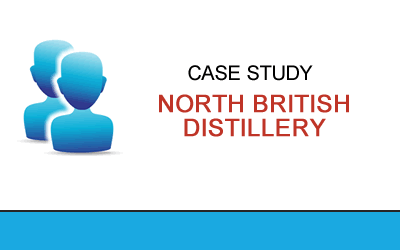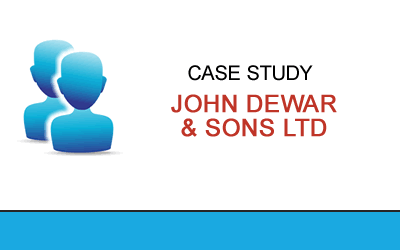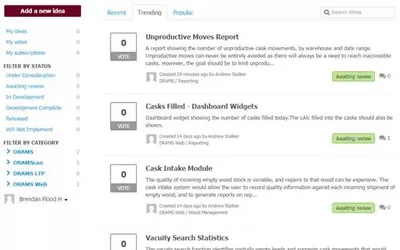Spreadsheets are probably one of the most used business tools around the world. From finance and accounting to inventory forecasting, contract management, human resource allocation or basic admin, organisations in every industry have found a use for spreadsheets in almost every business function.
In spirit production and distillery industries, the versatility of the humble spreadsheets has proven invaluable when recording key distillery data either as a sole solution or in conjunction with another system.
Yet despite the undeniable value they provide, they are not without their flaws, with statistics suggesting that almost 90% of all spreadsheets contain errors.
Transposition errors, “fat fingers” and inaccurate formulas are often to blame for these mistakes. But when your business’s financial and operational security is at stake, one small mistake can have devastating consequences – no matter how big your operation or the industry you are in.
After all, it was one cut-and-paste error that cost TransAlta $24 million and only a single incorrect value, which resulted in the overestimation of gross margins for RedEnvelope Inc, catastrophically throwing off their entire forecast projections.
Challenges of an Overdependence on Spreadsheets
When spreadsheets become the backbone of all operational, financial, and reporting processes, the risk of one of these unforeseen complications becoming reality becomes much more likely.
So here are 4 of the most common challenges associated with managing all distillery reporting in spreadsheets.
COLLABORATION
Despite the great leaps forward that have been achieved with online and cloud-based documents, spreadsheets often fail when used as a tool for collaboration or by large teams.
When multiple people are accessing, analysing and amending the same data in a single document, the spreadsheet’s flexibility, which was initially an appealing factor, often begins to work against its users.
Unless strict procedures are manually enforced, users have free reign to alter the document format or change formulas as and when they please, which, unless communicated clearly to the rest of the team, can result in confusion and costly mistakes.
Also, the more people edit and consolidate distillery data into a single spreadsheet, the more likely mistakes will be made, or essential information will be missed.
SCALABILITY
The number of rows and columns available in a spreadsheet is practically limitless, and new documents can be created with only a moment’s notice, all for no extra charge. In theory, this makes spreadsheets the ultimate scalable solution – one that can be as large or as small as you need it to be.
But in practice, we often find that the document spirit producers start with isn’t the one they need in the end. Over time, as requirements change and additional questions are asked of the data, new columns, rows and tabs are added, forcing the spreadsheet to evolve to fit the business’s changing needs.
But unless closely managed, this evolution rarely works out for the best:
- Records created before an update are rarely backdated with the newly required information.
- Individual users move or hide columns depending on their own needs.
- As the number of data entry fields grows and the document becomes more complex, users invent unofficial shortcuts to save time.
All of which can lead to mistakes and inaccurate data.
LIMITED DATA PROTECTION
Containing sensitive or operational data, protecting the information contained within spreadsheets is often an ongoing challenge.
While individual files can be password protected, spreadsheets are difficult to fully secure. As multiple people access the spreadsheet at different times for different reasons, it becomes almost impossible to know and control who has access to what information.
The other challenge of protecting your data in a spreadsheet is ensuring that it is always backed up, as even with a shared cloud server, this relies on individuals ensuring their version auto-saves as they work. As different people add different data at different times, version control and data governance can also become an important consideration, particularly when recording barrel location data, inventory updates and bulk spirit movements.
ADVANCED DATA ANALYSIS
Excel has over 475 formulas in its Functions Library, from simple mathematics to very complex statistical, logical, and engineering tasks. A fact which is perhaps both a blessing and a curse to spirit producers using excel for distillery record management.
These formulae allow an individual with average Excel Skills to produce reports and analyse distillery data for critical insights. However, this also means that the ability to perform advanced analytics and forecasting is limited to those with specific programming skills.
For example, accurately forecasting long-term production targets, allocating inventory based on blend recipe data or analysing the quality of empty wood stocks will involve increasingly complex calculations and data analysis, often requiring more than just the basic excel functions.
REPLACING SPREADSHEETS IN DISTILLERY REPORTING
The DRAMS Distillery Record and Management Solution offers a comprehensive alternative to spreadsheets in distillery reporting and management.
DRAMS records all spirit movements in barrel and in bulk, keeping a full history of all transactions, including all spirit losses and gains. The system focuses on tracking barrel locations within warehouses and is used to assist with the identification and efficient retrieval of stock.
The comprehensive inventory insights can also be used to produce critical reports and audit trails required by various custom bodies, ensuring regulatory compliance.
With an extensive range of additional modules, the core DRAMS functionality can be expanded to address a broader range of spirit production and inventory management requirements, including areas such as Barrel Labelling and Scanning, Long-Term Planning, and Wood Management.
DRAMS BUSINESS INTELLIGENCE
The latest DRAMS module, DRAMS Business Intelligence, provides new report writing and dashboarding capabilities.
Integrating directly with data sources contained within the DRAMS system, DRAMS BI empowers users to gain real-time visibility into distillery performance, simplify the overall reporting process and provide key stakeholders with the insights required to improve business performance.
For more information about DRAMS and all our available modules, download our product brochure, or speak to a consultant to arrange a demo.
























































































